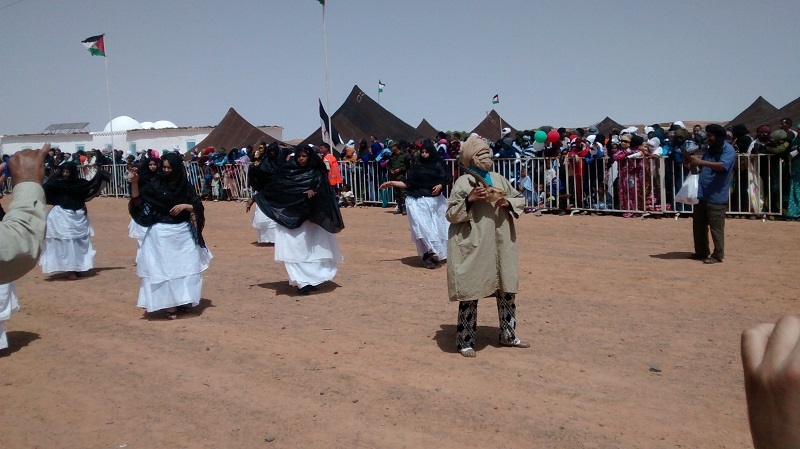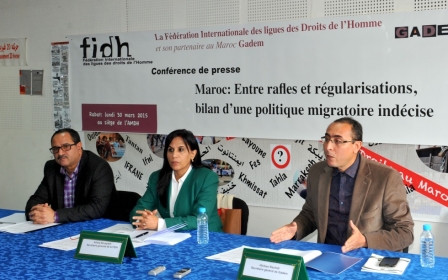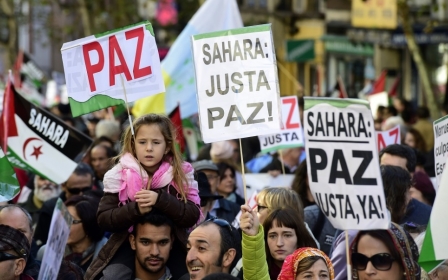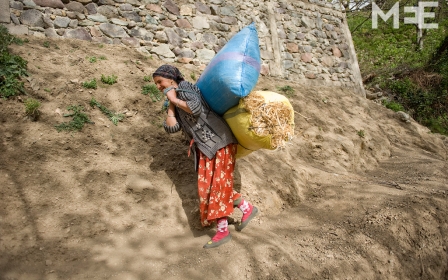Film festival highlights Sahrawi humanitarian crisis

TINDOUF, Algeria – Actors, filmmakers, artists, and refugees gathered in refugee camps near the town of Tindouf, southern Algeria, for the 12th year of the FiSahara international film festival, which ran from 28 April to 3 May.
The festival, held about 100 miles from Tindouf, saw dozens of films screened over four days in the Dakhla Sahrawi refugee camp. The Sahrawi refugees from neighboring Western Sahara, who have lived in desert refugee camps in southern Algeria for almost 40 years, invited the Spanish-run festival to highlight their continued quest for international justice.
The annual event is driven by the need to bring attention to a largely ignored issue of human rights and international law, according to Maria Carrion, the director of the festival.
“For the refugees of the Western Sahara, FiSahara is a lifeline to the world, an international event that helps to shed light on a 40-year-old forgotten conflict,” she told Middle East Eye.
Sahrawi refugees made this clear at the festival opening, when children passed around a translation of a poem requesting international help.
“Hello our friends, we need your help, we lost a lot, that's enough, we want our freedom, we want to laugh, we want to smile... let us live to together in peace, our friend, we need your help,” the poem read.
The festival opened with a procession of traditional Sahrawi dancing through the centre of the Dakhla camp.
The performance also included a woman dancing while holding the head of a gazelle and being pursued through the procession by a hunter with a rifle, in order to represent the lost art of Sahrawi hunting. Gazelle hunting was once possible in Western Sahara, but it isn't possible in the refugee camps.
The Sahrawi refugee crisis began in late 1975 just as Western Sahara (then Spanish Sahara) was due to be decolonised and Morocco's then monarch, King Hassan II, ordered an event known as the Green March, in which 20,000 Moroccan soldiers and 350,000 Moroccan citizens marched into the territory.
The event marked the beginning in earnest of Morocco’s invasion and eventual annexation of the territory of Western Sahara. In response, much of the indigenous Sahrawi population fled from the advancing Moroccan presence and sheltered across the Algerian border.
From the camps, the Sahrawi, under the banner of the Frente Polisario, fought Moroccan forces until 1991, when a ceasefire was brokered. The UN then pledged to hold a referendum for the Sahrawi population to decide the future status of the territory within six months.
The referendum has still not been held, and the Sahrawi refugees remain in Algeria. The terrain is hard, the camps isolated, and the refugees survive on international aid that has fallen since the global financial crisis of 2008.
A wide range of 36 films, including documentaries, feature films, and shorts, were shown at this year's festival. Among them, Mauritanian director Abderrahmane Sissako's 2014 hit Timbuktu, a double prize winner at Cannes last year. All were screened from the back of a lorry as thousands sat on the sand to watch.
Subtitles were provided in Spanish, Arabic, and English for films shown in languages from Kurdish to French and made in Iran, Western Sahara itself, Spain, the United States, and Palestine.
The festival’s top prize - a white camel - went to Pamela Yates's documentary on Guatemala, Granito: How to Nail a Dictator. The camel, MEE was told, will remain in the refugee camps.
“People like the festival because it's something very different for Dakhla camp,” said Haizaza, a Dakhla resident, at the closing ceremony. “When the festival isn't here it's very quiet, and everyone mostly stays in their tents. The festival is something rare and unusual.”
Despite the festival's generally celebratory mood, FiSahara began with inauspicious news for the Sahrawi activist movement, when the United Nations Security Council voted that day to extend the mandate of the UN's mission in Western Sahara, MINURSO, without adding a human rights monitoring mechanism as proposed by the African security council members.
UN human rights monitoring has long been sought by the Sahrawi due to the extreme levels of repression experienced by those refugees who remain in Moroccan-occupied Western Sahara.
According to Freedom House, occupied Western Sahara ranks as one of the most politically repressed territories on earth. Despite this, the UN mission remains one of only four that do not feature human rights monitoring.
The UN approach to the conflict has recently focused on negotiations between the Polisario and the Moroccan government in an attempt to find a middle ground settlement, however its efforts have stagnated.
Young Sahrawi at the festival were scathing about the UN's current role.
“We have absolutely no trust in the UN at all,” said Elbu, 24. “For me they are just helping the Moroccans - I call them the United Nothing.”
Morocco's control of over around 85 percent of the the territory of Western Sahara was consolidated before and after the UN organised a ceasefire by the laying of thousands of mines and building of a 2,600 kilometre (1,600 mile) sand wall manned by Moroccan military personnel.
The wall serves to keep out the Sahrawi refugees, who are able to enter the barren 20 percent that Morocco does not occupy.
However, according to Elbu, seeing UN peacekeepers standing with the Moroccan soldiers on the wall, known in the refugee camps as the wall of shame, is a particularly powerful image of how slanted many feel the UN's approach is.
“They are there with the Moroccans, their blue helmets are visible, but are they on the other side of the wall with us and the landmines? No,” he said.
“During all these years, the Sahrawi people have faced not only war, exile and brutal repression inside the occupied Western Sahara, but also the indifference and scandalous complicity of the international community,” said Jose Manuel Taboada, the president of CEAS-Sahara, a Spanish solidarity movement, in an address for the festival.
“As responsible citizens, we must continue to mobilise in order to succeed in getting the UN Security Council to work towards finding a just and definitive solution,” Manuel said.
Sahrawi activists in the Moroccan occupied territory face regular beatings, imprisonment, and worse. Security forces are rarely held accountable in an environment described by Human Rights Watch as one of “impunity”.
Due to the remote location of their 40-year humanitarian crisis, the Sahrawi have long recognised the need to attract outsiders to the refugee camps to foster international sympathy and international aid, not to mention diplomatic support.
This year the government of South Africa sent a delegation to the camps headed by its ambassador to Algiers for FiSahara.
More than 80 states recognise the Polisario's government in exile as an expression of support for the plight of the Sahrawi, and none formally recognise Morocco's hold on the territory.
However, if the Sahrawi are to begin to counter the support Morocco has in the UN Security Council from France and the United States they know they will need ever more allies in the developed world.
During the festival, 8,000 Sahrawi took to the boundaries of the largest refugee camp, Samara, to spell out Sahara Libre (Free Sahara) with their bodies so as to be visible from the air. Such stunts are seen as a necessary tactic to boost civil society support abroad.
“In the end we have to find ways in which our interests intersect with those of the international powers to help our cause,” says Habibullah Muhammad, a representative from the Sahrawi Youth Union in the camps.
“This is a global, not local conflict with international powers backing Morocco, and that is perhaps the biggest challenge for us in finding a peaceful solution that won't leave us here for decades more,” he said.
New MEE newsletter: Jerusalem Dispatch
Sign up to get the latest insights and analysis on Israel-Palestine, alongside Turkey Unpacked and other MEE newsletters
Middle East Eye delivers independent and unrivalled coverage and analysis of the Middle East, North Africa and beyond. To learn more about republishing this content and the associated fees, please fill out this form. More about MEE can be found here.




